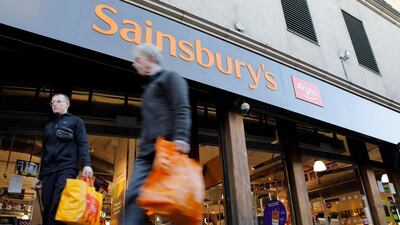British supermarket group Sainsbury's said up to 3,500 jobs were at risk on Thursday as the group reported a pre-tax loss of £137 million ($178.75) for the first half of the fiscal year.
The retailer said most of the job losses will come from its Argos stores, a catalogue retailer it bought in 2016, with 420 outlets set to be closed by March 2024. Sainsbury’s blamed its loss for the six months ended September 28, which reflected £438m of costs, on the Argos closures, and “market changes”.
“While we are working hard to help feed the nation through the pandemic, we have also spent time thinking about how we deliver for our customers and our shareholders over the longer term," said Simon Roberts, chief executive of Sainsbury’s.
“Over the next three years, we will make Argos a simpler, more efficient and more profitable business while still offering customers great convenience and value and improving availability.”

Sainsbury’s said its restructure includes the migration of Argos stores into its Sainsbury’s outlets and the closure of all its in-store meat, fish and delicatessen counters due to a fall in demand. The company said it aimed to find alternative roles for as many affected employees as possible and pointed out it had hired 52,000 extra staff since March.
UK retail has been hit hard during the pandemic due to the closure of stores in the first lockdown, with John Lewis cutting a further 1,500 jobs on Wednesday, adding to the 1,300 axed when it permanently shut eight stores in July.
Shoe retailer Clarks shoes has put the jobs of all 4,000 of its store staff on notice as part of its fight for survival, while Marks & Spencer reported its first loss in its 94 years as a listed company earlier in the week and said it had already cut 8,000 staff since March.
Meanwhile, Caterpillar, the US manufacturing firm, said it is planning to cut 700 jobs at its Northern Ireland operations in Larne, County Antrim. And UK lender Lloyds Bank said it was making 1,070 staff redundant on top of the 865 job losses earlier in the pandemic.
While supermarkets have benefited from being able to stay open during the lockdowns, the rewards in the early days “were comparatively small due to the cost of Covid-proofing their stores,” said Adam Vettese, analyst at multi-asset investment platform eToro.
Sainsbury’s spent £290m to Covid-proof its stores for customers and staff, which was partially offset by £230m in business rates relief.
“However, chains such as Sainsbury have been operating this way now for nearly eight months and so they will know how to run smoothly and to maximise sales as the country enters lockdown once again," Mr Vettesse said.
Digital sales at Sainsbury’s were up 117 per cent to £5.8bn in the first half of the fiscal year, accounting for nearly 40 per cent of total sales, while grocery sales rose 102 per cent.
Looking ahead, Sainsbury’s said it planned to lower food prices, grow its online grocery sales to meet further demand, increase the number of new convenience and neighbourhood hub outlets, and reduce plastic and food waste further.
"We will put food back at the heart of Sainsbury's," Mr Roberts said. "Our other brands - Argos, Habitat, Tu, Nectar and Sainsbury's Bank - must deliver for their customers and for our shareholders in their own right."
The company said it expects financial services returns and profits to double in five years, despite the challenges of Covid.
Underlying pre-tax profit stood £301m, ahead of the £238m made in the same period last year, as strong sales outweighed the extra costs and losses at Sainsbury’s Bank.
On Thursday, Mr Roberts said the company has received third-party expressions of interest in its banking operation.
"We have received some expressions of interest in the bank. But very early stages and there can be no guarantee that anything will come from these discussions," he said.
Mr Vettesse said the pandemic has forced supermarkets to become leaner and more modern. "Sainsbury's is a good example of that, where digital sales have doubled as a proportion of overall sales to 40 per cent," he said.
“Elsewhere, net debt is falling while full-year profits are expected to come in 5 per cent higher this year, despite the pandemic and the fact it has made a pre-tax loss in its interims. Overall, it means Sainsbury's is presenting a relatively compelling investment case right now.”


